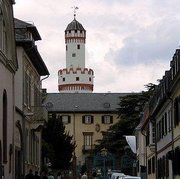Bad Homburg
|
|
For other uses of the word Homburg see Homburg
Bad Homburg is the capital city of the Hochtaunuskreis, Hessen, Germany, on the southern slope of the Taunus, bordering among others Frankfurt and Oberursel.
Formal name is Bad Homburg vor der Höhe (translated as Bad Homburg in front of the height), abbreviated as Bad Homburg v.d.H.
Elevation: 130 to 250 m in the city (128 to 683 m in the whole area); Position: 50° 13’ 45” N, 8° 36’ 43” E; Population: 52000.
The city is best known for its medically used mineral waters and spa (hence the prefix Bad) and casino.
Map_oberursel.jpg
Today, Bad Homburg is still, or again, one of the most wealthy cities in Germany, in part thanks to the vicinity to Frankfurt, as many of the directors and employees of the banks in Frankfurt live in Bad Homburg. (The Hochtaunuskreis and the Landkreis Starnberg regularly compete for the "title" of most wealthy district in Germany.)
Current (2004) city marketing slogan: Champagnerluft und Tradition (Champagne air and tradition).
Historical information
The first source with mineral water was found in 1834. The baths were visited often before 1918 by German and international royalty and nobility. The homburg hat is named after the city, as the later King Edward VII had it created it for him by a local hat-maker during a stay at the baths in Bad Homburg (year?). The first casino in Bad Homburg was opened in 1841/42 by brothers François Blanc (1806-1877) and Louis Blanc (1806-1852), which later founded the Casino in Monte Carlo, therefore the Bad Homburg Casino is also known as "mother" of Monte Carlo.
On November 30, 1989, Alfred Herrhausen, the head of the Deutsche Bank, was killed and his driver injured by a car bomb in Bad Homburg, allegedly by the RAF, though never conclusively proven.
Bad Homburg is twinned with Exeter in the United Kingdom.
External link
- Bad Homburg (http://www.bad-homburg.de)de:Bad Homburg vor der Höhe

